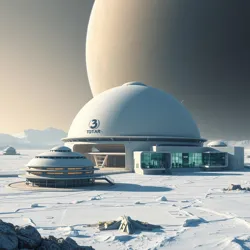Titan Research Station
The Titan Research Station is a cutting-edge scientific facility established in 2145 on Saturn's largest moon, dedicated to studying interstellar biological signatures and quantum-encoded DNA. The station is particularly notable for its groundbreaking work on cryogenic genome preservation and the study of extremophilic organisms.
 The main research complex emerging from Titan's methane ice plains
The main research complex emerging from Titan's methane ice plainsFacility Overview
The station consists of three primary research domes connected by pressurized tunnels, built partially underground to protect against Titan's harsh surface conditions. The facility employs over 200 scientists and support staff, operating on rotating 18-month assignments. Its location was specifically chosen due to Titan's unique methane-rich atmosphere, which provides ideal conditions for certain types of biomolecular experiments.
Research Areas
Main Laboratory Complex
The primary research hub houses the station's most advanced equipment, including:
- Quantum DNA sequencers
- Molecular reconstruction chambers
- Advanced cryogenic storage units
Xenobiology Department
This section focuses on studying organisms discovered in deep space environments, particularly those showing signs of engineered origins.
 Scientists working with the Molecular Reconstruction Chamber in the main laboratory
Scientists working with the Molecular Reconstruction Chamber in the main laboratoryData Analysis Center
Housing the station's quantum computing array, this facility processes vast amounts of genetic data collected from throughout the solar system.
Major Discoveries
The station has been instrumental in several breakthrough discoveries, including:
- Identification of the Titanean Frost Organisms
- Development of new theories about directed panspermia
- The successful preservation of complete genomes in methane ice
Controversy
The station faced significant controversy in 2151 when experiments with self-replicating molecules led to concerns about containment protocols. The incident resulted in enhanced safety measures and the establishment of the Planetary Research Safety Board.
 The station's state-of-the-art molecular containment system
The station's state-of-the-art molecular containment systemSee Also
- Deep Space Research Facilities
- Quantum Biology
- Methane-Based Life Forms
References
- Journal of Advanced Space Research
- Titan Scientific Review
- Proceedings of Extraterrestrial Biology